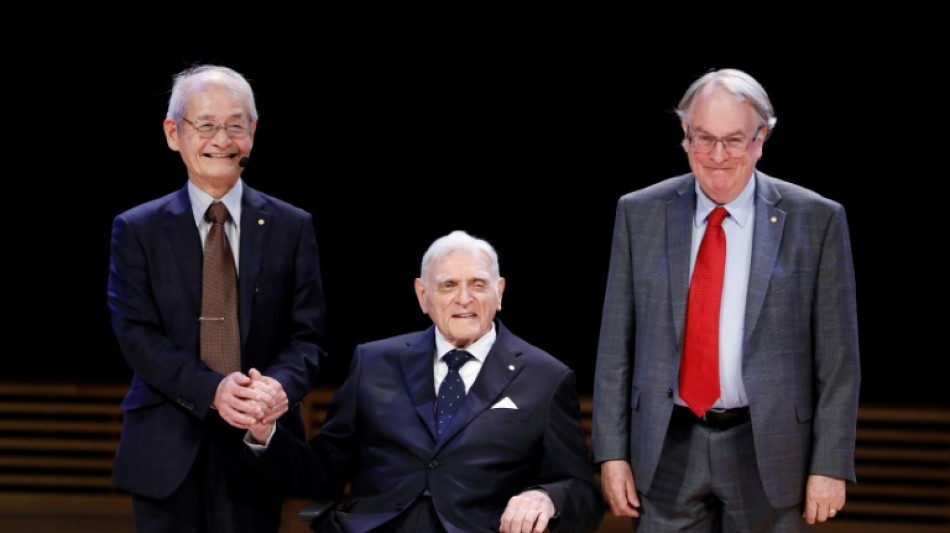
-
 India women's historic cricket World Cup win fires up T20 league
India women's historic cricket World Cup win fires up T20 league
-
South Korea's Lee says urged Xi to help curb North's nukes

-
 England's Bethell hits maiden Test century as family watch on
England's Bethell hits maiden Test century as family watch on
-
US car market expected to moderate in 2026

-
 Swiatek, Gauff ease to United Cup victories
Swiatek, Gauff ease to United Cup victories
-
Strasbourg face pitfalls of multi-club system as Chelsea take Rosenior

-
 Bethell stands tall as England 174-3 in final Test, nine behind
Bethell stands tall as England 174-3 in final Test, nine behind
-
Ex-CIA agent convicted of spying for Soviets dies in prison

-
 James, Doncic carry Lakers past Pelicans
James, Doncic carry Lakers past Pelicans
-
Vietnamese caught in Japan's illegal worker crackdown

-
 Nostalgia and new fans as Tamagotchi turns 30
Nostalgia and new fans as Tamagotchi turns 30
-
Oil extends losses as Trump flags Venezuela shipments, stocks wobble

-
 Overseas scholars drawn to China's scientific clout, funding
Overseas scholars drawn to China's scientific clout, funding
-
From music to mind reading: AI startups bet on earbuds

-
 'Of course it's not safe': small city in Russia tries to shrug off war
'Of course it's not safe': small city in Russia tries to shrug off war
-
'Simple' goodbye to Bardot lined up in Saint-Tropez

-
 England lose Crawley as they battle to save final Ashes Test
England lose Crawley as they battle to save final Ashes Test
-
Nvidia CEO praises robots as 'AI immigrants'

-
 Talks on Ukraine guarantees to continue after Paris 'progress'
Talks on Ukraine guarantees to continue after Paris 'progress'
-
WELT Unveils the World's First "AI-Combo Drug" at CES 2026

-
 AI, outdated visuals fuel misinformation after Maduro capture
AI, outdated visuals fuel misinformation after Maduro capture
-
John Harbaugh fired by Ravens after 18 seasons

-
 Jays and Astros hope to match Dodgers' Japan success
Jays and Astros hope to match Dodgers' Japan success
-
Under-fire Frank claims support of Tottenham hierarchy

-
 Fletcher asked for Ferguson's advice before taking Man Utd interim role
Fletcher asked for Ferguson's advice before taking Man Utd interim role
-
Juventus bounce back in Serie A as Roma, Como in Champions League hunt

-
 New Venezuela leader says 'no foreign power' running country
New Venezuela leader says 'no foreign power' running country
-
NBA Bulls sign Japanese guard Kawamura

-
 Rubio was called a sell-out, then he won on Venezuela
Rubio was called a sell-out, then he won on Venezuela
-
Relief mixed with fear as Venezuelans cross into Colombia

-
 Nine dead in clashes between Syria govt, Kurdish forces in Aleppo
Nine dead in clashes between Syria govt, Kurdish forces in Aleppo
-
Forest boost survival bid to leave West Ham in turmoil

-
 Boulbina stunner takes Algeria through, Diallo sparkles for I. Coast
Boulbina stunner takes Algeria through, Diallo sparkles for I. Coast
-
Trump considering military options to acquire Greenland

-
 Diallo stars as Ivory Coast set up Egypt showdown in AFCON
Diallo stars as Ivory Coast set up Egypt showdown in AFCON
-
Teen killed in anti-conscription protest in Jerusalem

-
 Diallo stars as Ivory Coast set up Egyptsh owdown in AFCON
Diallo stars as Ivory Coast set up Egyptsh owdown in AFCON
-
Black Caps go spin heavy for T20 World Cup campaign

-
 Brazil oil drilling near Amazon halted over 'fluid leak'
Brazil oil drilling near Amazon halted over 'fluid leak'
-
Western allies agree Ukraine guarantees after Paris 'progress'

-
 DR Congo's human statue becomes AFCON's most famous fan
DR Congo's human statue becomes AFCON's most famous fan
-
Boulbina extra-time stunner takes Algeria through to AFCON quarter-finals

-
 Doncic, Giannis lead NBA All-Star voting
Doncic, Giannis lead NBA All-Star voting
-
NASCAR commissioner Phelps steps down

-
 Domen Prevc secures Four Hills ski jump title to emulate brother
Domen Prevc secures Four Hills ski jump title to emulate brother
-
Fletcher says Man Utd coaching job was not in 'wildest dreams'

-
 US forces killed 55 Venezuelan, Cuban military personnel in Maduro raid: tolls
US forces killed 55 Venezuelan, Cuban military personnel in Maduro raid: tolls
-
Maduro lawyer previously defended WikiLeaks' Julian Assange

-
 O'Neill not sure he has 'energy' for long Celtic stay
O'Neill not sure he has 'energy' for long Celtic stay
-
Como sweep past Pisa to go fourth in Serie A


Nobel-winning lithium battery inventor John Goodenough dies at 100
John Goodenough, who shared the 2019 Nobel Prize in Chemistry for developing the lithium-ion battery that revolutionized modern life, has died at the age of 100, the University of Texas announced.
Goodenough died on Sunday, said the university, where he worked as an engineering professor.
The US scientist's contributions to the development of lithium-ion batteries paved the way for smartphones and a fossil fuel-free society.
"John's legacy as a brilliant scientist is immeasurable -- his discoveries improved the lives of billions of people around the world," Jay Hartzell, president of the University of Texas at Austin, said in the statement.
"He was a leader at the cutting edge of scientific research throughout the many decades of his career."
In 1986, at the age of 64, Goodenough joined the University of Texas where he served as a faculty member in the Cockrell School of Engineering for 37 years.
"The world has lost an incredible mind and generous spirit. He will be truly missed among the scientific and engineering community, but he leaves a lasting legacy that will inspire generations of future innovators and researchers," said Sharon Wood, provost of the University of Texas.
Goodenough became the oldest person to win a Nobel Prize when at the age of 97 he shared the 2019 chemistry award with Britain's Stanley Whittingham and Akira Yoshino of Japan for the invention of the lithium-ion battery.
Seeking an alternative source of power during the oil crisis of the 1970s, Whittingham discovered a way to harness the potential energy in lithium, a metal so light it floats on water.
However, the battery he constructed was too unstable to be used.
Goodenough built on Whittingham's prototype, substituting a different metal compound and doubling the potential energy of the battery to four volts.
This paved the way for far more powerful and durable batteries in the future.
In 1985, Yoshino instead used a carbon-based material that stores lithium ions, finally rendering the battery commercially viable.
The culmination of the trio's research resulted in the most powerful, lightweight and rechargeable battery ever seen.
- 'A rechargeable world' -
"They created a rechargeable world," the Royal Swedish Academy of Sciences, which awarded the accolade, said at the time.
"Lithium batteries have revolutionized our lives since they first entered the market in 1991," and were "of the greatest benefit to humankind".
Their work considerably boosted human mobility, and allowed millions in developing countries to access information and services online with just a mobile phone.
Lithium-ion batteries have also reduced the reliance on planet-warming fossil fuels, especially in electric cars.
On receiving news of his Nobel, Goodenough expressed pride in the worldwide impact of his work.
"I'm extremely happy that my discovery has been able to help communication through the world," he said.
"We need to build relationships, not wars. I am happy if people use this for good, not evil."
Born in 1922 in Germany, Goodenough grew up in the United States and earned a bachelor's degree in mathematics from Yale University.
After serving as a meteorologist in the US Army during World War II, Goodenough earned a master's degree and a PhD in physics at the University of Chicago in 1952, according to the University of Texas statement.
From 1952, he worked at the Massachusetts Institute of Technology's Lincoln Laboratory for 24 years and laid the groundwork for the development of computer random-access memory (RAM).
Goodenough was head of the inorganic chemistry laboratory at Oxford University when he made his lithium-ion battery discovery.
In 1986, he joined the University of Texas where he was known for his "quick wit and infectious laugh."
He was still coming into work well into his 90s, the university said.
Goodenough and his wife Irene were married for 70 years, until her death in 2016.
P.Stevenson--AMWN


